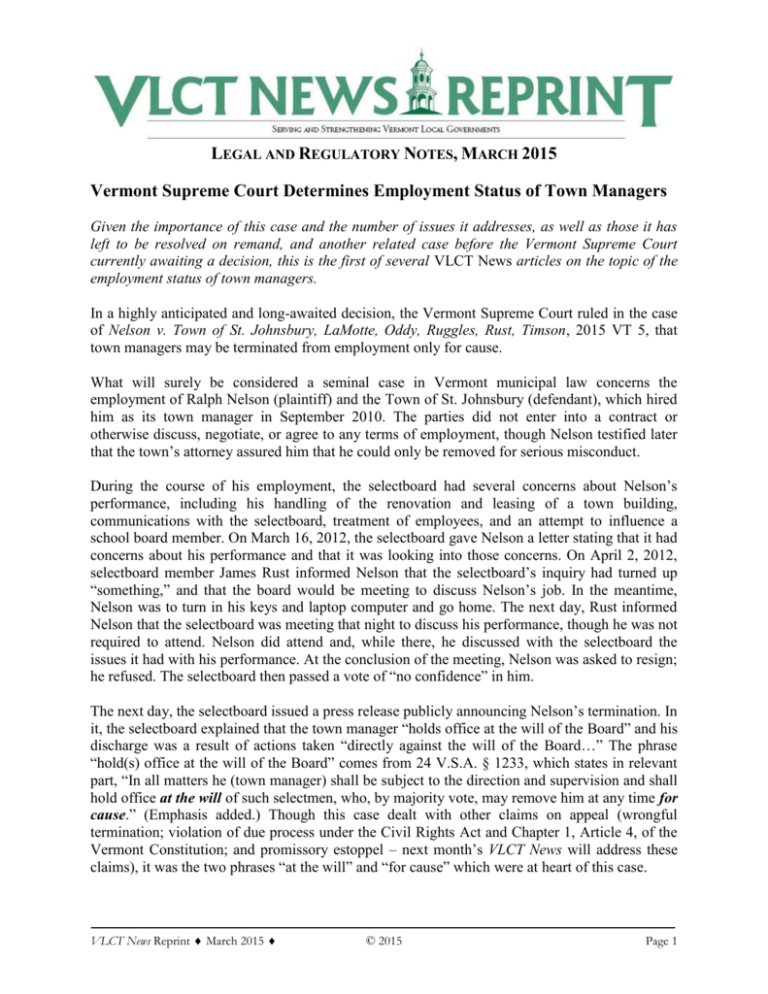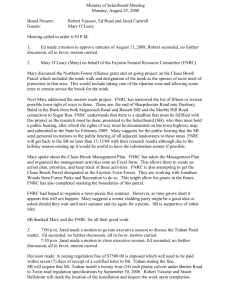Employment of Town Managers
advertisement

LEGAL AND REGULATORY NOTES, MARCH 2015 Vermont Supreme Court Determines Employment Status of Town Managers Given the importance of this case and the number of issues it addresses, as well as those it has left to be resolved on remand, and another related case before the Vermont Supreme Court currently awaiting a decision, this is the first of several VLCT News articles on the topic of the employment status of town managers. In a highly anticipated and long-awaited decision, the Vermont Supreme Court ruled in the case of Nelson v. Town of St. Johnsbury, LaMotte, Oddy, Ruggles, Rust, Timson, 2015 VT 5, that town managers may be terminated from employment only for cause. What will surely be considered a seminal case in Vermont municipal law concerns the employment of Ralph Nelson (plaintiff) and the Town of St. Johnsbury (defendant), which hired him as its town manager in September 2010. The parties did not enter into a contract or otherwise discuss, negotiate, or agree to any terms of employment, though Nelson testified later that the town’s attorney assured him that he could only be removed for serious misconduct. During the course of his employment, the selectboard had several concerns about Nelson’s performance, including his handling of the renovation and leasing of a town building, communications with the selectboard, treatment of employees, and an attempt to influence a school board member. On March 16, 2012, the selectboard gave Nelson a letter stating that it had concerns about his performance and that it was looking into those concerns. On April 2, 2012, selectboard member James Rust informed Nelson that the selectboard’s inquiry had turned up “something,” and that the board would be meeting to discuss Nelson’s job. In the meantime, Nelson was to turn in his keys and laptop computer and go home. The next day, Rust informed Nelson that the selectboard was meeting that night to discuss his performance, though he was not required to attend. Nelson did attend and, while there, he discussed with the selectboard the issues it had with his performance. At the conclusion of the meeting, Nelson was asked to resign; he refused. The selectboard then passed a vote of “no confidence” in him. The next day, the selectboard issued a press release publicly announcing Nelson’s termination. In it, the selectboard explained that the town manager “holds office at the will of the Board” and his discharge was a result of actions taken “directly against the will of the Board…” The phrase “hold(s) office at the will of the Board” comes from 24 V.S.A. § 1233, which states in relevant part, “In all matters he (town manager) shall be subject to the direction and supervision and shall hold office at the will of such selectmen, who, by majority vote, may remove him at any time for cause.” (Emphasis added.) Though this case dealt with other claims on appeal (wrongful termination; violation of due process under the Civil Rights Act and Chapter 1, Article 4, of the Vermont Constitution; and promissory estoppel – next month’s VLCT News will address these claims), it was the two phrases “at the will” and “for cause” which were at heart of this case. VLCT News Reprint March 2015 © 2015 Page 1 For context, an at-will employee can be terminated under Vermont law for any reason, or none at all, so long as the reason is not illegal, (e.g. discrimination), whereas termination “for cause” requires “some substantial shortcoming detrimental to the employer’s interests, which the law and a sound public opinion recognize as a good cause for his dismissal.” In re Brooks, 135 Vt. 563, 568 (1977). The characterization of the employment relationship is a crucial one for Vermont’s municipalities because public employees who can only be terminated for cause have a constitutionally-protected property interest in their continued employment and cannot be fired without due process – a degree of procedural protection not afforded to at-will employees. Gilbert v. Homar, 520 U.S. 924 (1997). Nelson’s suit against the town alleged in part that the selectboard did not have the right to terminate his employment without cause. The trial court disagreed, ruling that a town manager is an at-will employee and as such can be terminated for any reason. In reaching its decision, the trial court attempted to harmonize phrases used in the governing law that appeared to be in conflict. The trial court reasoned that the legislature used the words “hold office at the will of the selectmen” to reflect the default rule in Vermont, which is that any employee is presumed to be “at-will.” It also opined that the legislature used the phrase “remove him at any time for cause” to reflect a selectboard’s authority to negotiate specific terms of a contract with a town manager which alter that employment relationship such that it becomes terminable only for cause. The decision stated: The two parts of the provision may be reconciled without difficulty in that they enable a selectboard to hire a person as town manager on either an at-will basis or on modified terms that provide for a specific duration of employment, but if the latter option is chosen, any contract must, by statute, provide for termination for just cause. Nelson v. Town of St. Johnsbury Selectboard, et al., Docket No. 93-4-12 Cacv. The Vermont Supreme Court disagreed with the trial court’s approach and consequently its holding. Rejecting both parties’ contention and the lower court’s premise that a law with seemingly contradictory language is clear on its face, the Court treated it as ambiguous and looked to the legislative history to discern its meaning. The law at issue, 24 V.S.A. § 1233, was enacted in 1917 and left untouched to this day. Lacking any direct evidence of legislative intent behind the law, the Court looked at the context in which it was written. Specifically, this meant comparing the historical meaning of the phrases at issue – “at the will of/at will” and “for cause” – to their modern meaning. This approach proved instructive as it revealed that the words “at will” had a very different meaning in 1917 than they do today. In fact, as the Court notes, it was not until the late 1940s that the phrase “at will” referred to an employment relationship terminable for any reason. Up until that time, what we today recognize as at-will employment was signified by using the terms “at the pleasure of” or “during the pleasure of.” The Court therefore read “at the will of such selectmen” as meaning that only the selectboard, and no other authority, may terminate the manager’s employment. The phrase “for cause” on the other hand meant the same then as it does now: a limitation on the exercise of an employer’s discretionary authority to terminate an employee. With these interpretations in mind, the Court read the town manager statute as follows: “In all matters he shall be subject to the direction and supervision and shall hold office at the will of such selectmen [i.e., only the selectboard can terminate the town manager], who, by majority vote, may remove him at any time for cause” [a limitation on the selectboard’s removal VLCT News Reprint March 2015 © 2015 Page 2 authority]. 24 V.S.A. § 1233. Almost one hundred years after the law was first enacted, the question is finally settled – a town manager is a public employee whose employment can only be terminated for cause. What exactly does that mean? In past cases, the Court has declared that termination of public employees requires “some substantial shortcoming detrimental to the employer’s interests, which the law and a sound public opinion recognizes as a good cause for his dismissal.” In re Brooks, 135 Vt. 563 at 568 (1997). In this matter, however, because the Court had not had previous occasion to define what constitutes sufficient cause under this law, and because there were disputes of material fact between the parties concerning the grounds for Nelson’s termination, the Court remanded to the trial court the question of whether Nelson was wrongfully terminated. For that and several other important questions, we will just have to wait for the case to be resolved. In the meantime, if you have any employment status questions, please contact the Municipal Assistance Center at 1-800-649-7915 for assistance and potential referral to VLCT’s Employment Practices Liability program if your municipality is a PACIF member. The decision is archived at http://info.libraries.vermont.gov/supct/current/op2013-386.html. Garrett Baxter, Senior Staff Attorney VLCT Municipal Assistance Center VLCT News Reprint March 2015 © 2015 Page 3








